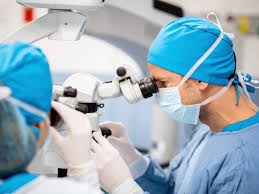Ophthalmology Department in Hospitals: A Comprehensive Guide

The ophthalmology department in hospitals plays a critical role in the healthcare system, offering specialized care for eye health and vision. These departments serve as hubs for diagnosing, treating, and managing a wide range of ocular conditions, from minor eye irritations to complex surgeries. Below, we provide a detailed look at the structure, services, and significance of ophthalmology departments.
What Is an Ophthalmology Department?
The ophthalmology department is a specialized unit within hospitals dedicated to the treatment of eye-related disorders. Staffed by skilled ophthalmologists, optometrists, nurses, and technicians, this department combines state-of-the-art equipment and expertise to provide comprehensive eye care.
Key Services Offered by Ophthalmology Departments
1. Diagnostic Services
Ophthalmology departments are equipped with advanced diagnostic tools to identify various eye conditions, such as:
- Visual acuity tests to assess vision clarity.
- Ocular imaging using optical coherence tomography (OCT) for detailed retinal analysis.
- Tonometry tests for glaucoma screening by measuring intraocular pressure.
- Slit-lamp exams for detecting corneal or anterior segment abnormalities.
2. Medical Treatments
The department provides targeted medical treatments, including:
- Medication for infections and inflammation: prescription eye drops or oral antibiotics.
- Intravitreal injections for managing macular degeneration or diabetic retinopathy.
- Laser therapy for conditions like diabetic eye disease or retinal tears.
3. Surgical Procedures
Ophthalmology departments excel in performing surgical interventions such as:
- Cataract surgery is the most common procedure to restore vision by replacing the clouded lens.
- LASIK and PRK surgeries for vision correction.
- Glaucoma surgeries, including trabeculectomy or tube shunt procedures.
- Retinal surgeries, such as vitrectomy for detached retinas.
4. Vision Rehabilitation
Hospitals often include vision rehabilitation programs aimed at helping patients adapt to vision loss with tools like:
- Low-vision aids, including magnifiers and adaptive devices.
- Guidance for improving day-to-day functioning with reduced sight.
Advanced Technology in Ophthalmology Departments
Modern ophthalmology relies on cutting-edge technology to deliver precise care. Some notable advancements include:
- Femtosecond lasers for bladeless cataract and refractive surgeries.
- Adaptive optics imaging for high-resolution views of retinal cells.
- Artificial intelligence tools aid in the early detection of conditions like diabetic retinopathy and glaucoma.
- Tele-ophthalmology platforms that allow remote consultations and screenings.
The Role of Ophthalmologists and Staff
The success of any ophthalmology department hinges on its personnel.
- Ophthalmologists are medical doctors trained to diagnose and treat all eye diseases, perform surgeries, and prescribe corrective lenses.
- Optometrists focus on routine eye exams, prescribing glasses, and managing some eye diseases.
- Ophthalmic nurses and assistants support patient care by performing preliminary examinations, assisting in surgeries, and providing postoperative care.
Common Conditions Treated in Ophthalmology Departments
Ophthalmology departments address a wide range of conditions, including:
- Cataracts: characterized by clouding of the lens, leading to vision impairment.
- Glaucoma: A group of eye diseases that damage the optic nerve, potentially causing blindness if untreated.
- Diabetic Retinopathy: A complication of diabetes affecting the retina's blood vessels.
- Macular Degeneration: age-related deterioration of the central retina, impairing sharp vision.
- Dry Eye Syndrome: chronic lack of lubrication on the eye's surface.
- Strabismus: misalignment of the eyes that can impact binocular vision.
Preventive Eye Care and Public Outreach
Ophthalmology departments also focus on preventive care and education.
- Routine eye exams help detect problems early, reducing the risk of severe complications.
- Public awareness campaigns about eye health promote preventive measures like proper nutrition, UV protection, and regular screenings.
Why Choose a Hospital Ophthalmology Department?
Hospital-based ophthalmology departments offer several advantages over standalone clinics:
- Comprehensive Care: Access to multidisciplinary teams ensures holistic patient care.
- Emergency Services: Many hospitals provide 24/7 emergency care for acute eye injuries or conditions.
- Integrated Facilities: Availability of related specialties, such as neurology and endocrinology, facilitates coordinated care for systemic diseases impacting vision.
Future Trends in Ophthalmology
The field of ophthalmology continues to evolve with promising innovations:
- Gene therapies for inherited retinal diseases.
- Regenerative medicine uses stem cells to restore damaged tissues.
- Wearable diagnostic devices for continuous eye health monitoring.
- AI-driven decision support systems enhance diagnostic accuracy.
The ophthalmology department in hospitals stands as a cornerstone of eye care, blending expertise, technology, and compassion to preserve and restore vision. Patients benefit from a multidisciplinary approach and advanced treatments tailored to their unique needs, ensuring optimal outcomes.
- Questions and Answers
- Opinion
- Motivational and Inspiring Story
- Technology
- Live and Let live
- Focus
- Geopolitics
- Military-Arms/Equipment
- Security
- Economy
- Beasts of Nations
- Machine Tools-The “Mother Industry”
- Art
- Causes
- Crafts
- Dance
- Drinks
- Film/Movie
- Fitness
- Food
- Games
- Gardening
- Health
- Home
- Literature
- Music
- Networking
- Other
- Party
- Religion
- Shopping
- Sports
- Theater
- Health and Wellness
- News
- Culture

